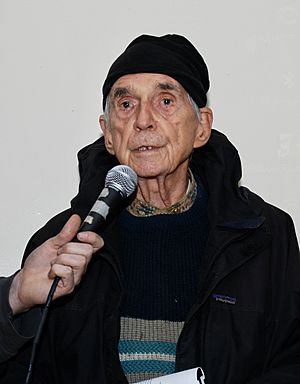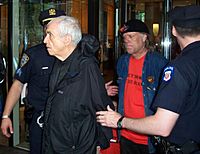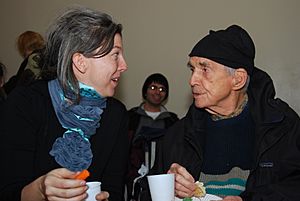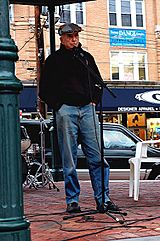Daniel Berrigan facts for kids
Quick facts for kids
Daniel Berrigan
|
|
|---|---|

Berrigan in 2008
|
|
| Born |
Daniel Joseph Berrigan
May 9, 1921 |
| Died | April 30, 2016 (aged 94) New York City, New York, US
|
| Occupation |
|
| Known for | |
| Relatives | Philip Berrigan (brother) |
Daniel Joseph Berrigan (May 9, 1921 – April 30, 2016) was an American Jesuit priest, peace activist, poet, and author. He was known for his strong beliefs against war and violence.
Berrigan actively protested the Vietnam War. His actions led him to be on the Federal Bureau of Investigation's "most wanted list". He was the first priest ever to be on this list. He also appeared on the cover of Time magazine and spent time in prison.
Throughout his life, Berrigan remained a leading peace activist in the United States. In 1980, he helped start the Plowshares movement. This group protested nuclear weapons and brought him back into the national spotlight. Berrigan was a respected author who wrote about 50 books. He was also a teacher and a university professor.
Contents
Early Life and Education
Daniel Berrigan was born in Virginia, Minnesota. His father, Thomas Berrigan, was an Irish Catholic and a trade union member. His mother, Frieda Berrigan, had German roots. Daniel was the fifth of six sons. His younger brother, Philip Berrigan, also became a famous peace activist.
When Daniel was five, his family moved to Syracuse, New York. He joined the Jesuits right after high school in 1939. In 1946, he earned a bachelor's degree from St. Andrew-on-Hudson. This was a Jesuit seminary in Hyde Park, New York. He received a master's degree from Woodstock College in Baltimore, Maryland, in 1952. On June 19, 1952, he became a priest.
Teaching and Activism
Berrigan taught at St. Peter's Preparatory School in Jersey City from 1946 to 1949. In 1954, he taught French and theology at Brooklyn Preparatory School. In 1957, he became a professor at Le Moyne College in Syracuse. That same year, he won the Lamont Prize for his poetry book, Time Without Number.
He became known for his strong views on social justice. He worked to fight poverty and improve the relationship between priests and regular church members. While at Le Moyne, he started its International House.
In 1963, Berrigan traveled to Paris. There, he met French Jesuits who were concerned about the situation in Indochina. Inspired by this, he and his brother Philip started the Catholic Peace Fellowship. This group organized protests against the Vietnam War.
On October 28, 1965, Berrigan helped create Clergy and Laymen Concerned About Vietnam (CALCAV). This group was founded at the Church Center for the United Nations. Many important people joined, including Dr. Martin Luther King Jr.. Dr. King gave his famous 1967 speech Beyond Vietnam: A Time to Break Silence through CALCAV.
From 1966 to 1970, Berrigan worked at Cornell University. He was an assistant director for religious groups on campus. He also advised Cornell University's first student group for gay rights in 1968.
Berrigan taught or ran programs at several universities. These included Union Theological Seminary, Loyola University New Orleans, Columbia, Cornell, and Yale. He spent the longest time at Fordham University, a Jesuit university in the Bronx. He was even a poet-in-residence there for a while.
Berrigan also appeared briefly in the 1986 film The Mission. He played a Jesuit priest and helped as a consultant for the movie.
Major Protests and Activism
Protesting the Vietnam War
Berrigan, his brother Philip, and Trappist monk Thomas Merton formed a group against the Vietnam War. They wrote letters to newspapers asking for the war to end. In 1967, Daniel saw his brother Philip arrested. Philip had poured blood on draft records as part of the Baltimore Four protest. Philip was sent to prison. These events made Daniel even more determined to protest against war.
In January 1968, Berrigan traveled to Hanoi with Howard Zinn. This was during the Tet Offensive. They went to bring back three American airmen. These were the first American prisoners of war released by North Vietnam.
In 1968, Berrigan signed a pledge to refuse tax payments. This was to protest the Vietnam War. He also appeared in the anti-Vietnam War film In the Year of the Pig.
The Catonsville Nine
On May 17, 1968, Daniel Berrigan, his brother Philip, and seven other Catholic protesters took action. They used a homemade liquid to destroy 378 draft files. This happened in the parking lot of the draft board in Catonsville, Maryland. They did this to protest the Vietnam War.
Berrigan was arrested and sentenced to three years in prison. Before going to prison, he went into hiding with help from friends. While he was hiding, he was interviewed for a documentary called The Holy Outlaw. The Federal Bureau of Investigation caught him on August 11, 1970. He was then sent to the Federal Correctional Institution in Danbury, Connecticut. He was released on February 24, 1972.
The trial of the Catonsville Nine was very important. It changed how people protested the Vietnam War. It inspired activists to do more acts of civil disobedience, like burning draft cards. The New York Times said that Berrigan's actions helped "shape the tactics of opposition to the Vietnam War."

On September 9, 1980, Berrigan, his brother Philip, and six others started the Plowshares movement. They were called the "Plowshares Eight." They entered a General Electric nuclear missile facility in King of Prussia, Pennsylvania. There, they damaged parts of nuclear warheads. They also poured blood onto documents. They were arrested and faced many charges. After ten years of appeals, they were paroled. Their story was told in the 1982 film In the King of Prussia. The film starred Martin Sheen and featured the Plowshares Eight as themselves.
Caring for Life
Berrigan believed in a "consistent life ethic." This means he believed in respecting all human life.
AIDS Activism
In 1989, Berrigan published a book called Sorrow Built a Bridge: Friendship and AIDS. It shared his experiences helping AIDS patients at St. Vincent's Hospital. He spoke about how both the church and society sometimes treated AIDS patients badly. He said that this made their lives harder.
Other Activism
Even later in his life, Berrigan continued his activism. He helped AIDS patients in New York City. He also spoke out against American military actions in other countries. This included conflicts in Central America, the Gulf War, the Kosovo War, and the wars in Afghanistan and Iraq. He was also against the death penalty. He supported the Occupy movement, which protested economic inequality.
Some people consider Berrigan to be a Christian anarchist. This means he believed in living by Christian values without needing government rules.
In Media
- On January 25, 1971, he was featured on the cover of Time magazine with his brother Philip.
- Adrienne Rich's poem "The Burning of Paper Instead of Children" mentions the Catonsville Nine.
- It is often said that "the radical priest" in Paul Simon's song "Me and Julio Down by the Schoolyard" was inspired by Berrigan.
- Lynne Sachs's film Investigation of a Flame is about the Berrigan brothers and the Catonsville Nine.
- Berrigan's play The Trial of the Catonsville Nine (1970) opened in New York City in 1971. It was later made into a 1972 film produced by Gregory Peck.
- Berrigan was interviewed in the 1968 Vietnam War documentary In the Year of the Pig.
- He also appeared in the 1983 film In the King of Prussia, which starred Martin Sheen.
- His story is included in the 2006 book Generation on Fire: Voices of Protest from the 1960s.
- The 2013 documentary Hit & Stay explores his role in the Catonsville Nine.
- Dar Williams' song "I Had No Right" is about Berrigan and his trial.
- In the 2022 TV show Gaslit, an anti-war protester mentions the Berrigan brothers.
Death
Daniel Berrigan died on April 30, 2016. He passed away in the Bronx, New York City, at the Jesuit infirmary at Fordham University. He had lived on the Upper West Side of New York City since 1975.
Awards and Recognition
- 1956: Lamont Poetry Selection
- 1974: War Resisters League Peace Award
- 1974: Gandhi Peace Award (he accepted it, then later resigned)
- 1988: Thomas Merton Award
- 1989: Pax Christi USA Pope Paul VI Teacher of Peace Award
- 1991: The Peace Abbey Foundation Courage of Conscience Award
- 1993: Pacem in Terris Award
- 2008: Honorary Degree from the College of Wooster
- 2017: The Daniel Berrigan Center was named in his honor in New York City.
See also
 In Spanish: Daniel Berrigan para niños
In Spanish: Daniel Berrigan para niños
- Christian pacifism
- List of peace activists
- Catholic Worker Movement
- Dorothy Day
 | Sharif Bey |
 | Hale Woodruff |
 | Richmond Barthé |
 | Purvis Young |



